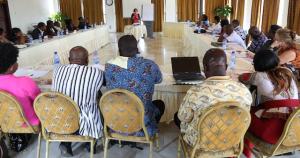Partners review the Fight Against Epilepsy Initiative Programme in Ghana
Accra, 20 April 2016 – The Ministry of Health and WHO with support from Sanofi Espoir Foundation conducted a national review of the Fight Against Epilepsy Initiative, WHO Pilot Programme on Reducing Epilepsy Treatment Gap was conducted on 19 April 2016. The review was intended to take an in-depth look at the performance of the programme over the past 4 years (2012 to 2015) within the context of the large numbers of epilepsy cases (270 000) and a treatment gap estimated at 85% and agree on areas of scale up.
Speaking at the meeting, Dr Cynthia Sottie the Project Coordinator of the Fight Against Epilepsy Initiative (FAEI) at the Ministry of Health said that since the start of the project in 2012, a total of 3603 cases had been registered as at December 2014 (68.5%) increase as compared 1663 cases recorded prior to the project.
“In spite of the gains made at reaching over 3000 patients, epilepsy patients and programme still face enormous challenges. Among these are: Inadequate human resources with only 5 neurologists, 17 psychiatrists and a few number of community psychiatric nurses serving all epilepsy patients in the whole country; poor capacity for epilepsy service provision and care; frequent shortage of free Anti-epileptic medicines and low public knowledge and attitude about epilepsy”, says Dr Cynthia Sottie, Project Coordinator for FAEI. Other challenges are stigma and cultural beliefs of the condition and poor financial resources allocated to epilepsy services adds Dr Sottie.
Since its inception in 2012, the FAEI project has reduced the treatment gap among epilepsy patients by 21% up from 86% prior to the project and improved quality of life of 85% in the 10 districts of Northern, Volta, Eastern, Greater Accra and Central Regions. Capacity building was also conducted during the projects implementation by training medical personnel and community volunteers to support the patients. In total 1454 people were trained including 14 medical personnel as trainer of trainers and supervisors, 685 non specialists, 730 community volunteers and 25 personal trained in the quantification of medicines.
To close the information gap in the communities on epilepsy, the project supported the awareness creation of an estimated 65000 people on epilepsy through durbars, health education in collaboration with traditional and faith healers, religious leaders, champions and advocates and families of people living with epilepsy. Support Supervision visits by specialists to project sites were conducted to strengthen the care and treatment of epilepsy patients. The WHO Mental health Gap document was adapted for training and public education and promotion materials were developed and distributed.
In Ghana, epilepsy treatment services are provided alongside those for psychiatric conditions. By policy of Ghana treatment services for epilepsy are provided free just as for psychiatric conditions and services are provided within psychiatric units of health facilities and the three psychiatric hospitals. The majority of cases in the country are largely treated by traditional and faith healers in prayer camps while others are just left to their fate. Specialist services are provided at the Teaching Hospitals.
Looking forward, the project intends to scale up treatment, capacity building, community sensitizations and education, support supervision and engagement of all stakeholders in ensuring quality access and service provision for people living with epilepsy in all districts in the 5 regions. Currently only 10 districts of the 5 Regions are benefiting from the programme.
According to Dr Tarun Dua, Department of Mental Health and Substance Abuse WHO/HQ, the project will also focus on strengthening health systems including data management, advocacy, engagement with key partners and NGOs and ensure patients with epilepsy have access to medications.
‘WHO in close collaboration with the Ministry of Health will press on with its hard work to ensure that patients with epilepsy get equal access to health care and services by focusing on providing technical support and advocacy at all levels,” says Mrs Edith Annan, Focal person for the programme at the WHO country office.
Epilepsy is neurological disorder, affects over 50 million people globally. 80% of people affected are in low/ middle-income countries and up to 90% of these do not receive treatment. Treatment is effective and inexpensive. 70% of people with epilepsy can be seizure free after 2 to 5 years of successful treatment. Epilepsy can be life threatening. On the positive side however, epilepsy is not contagious and people can live a normal life with the disease.
The review meeting was attended by site coordinators in the project districts, the National Coordinating Committee members, Deputy Directors of Institutional care in the five regions, the health promotion unit, the Director of Pharmaceutical services, civil society organizations and the representatives of the health promotion unit specify the categories of people in the meeting) from 10 Regions in Ghana where the project has been implemented within the last 4 years.
______________________________________________________
For more information, please contact:
AJELLO, Pauline Loyce, Email: ajellopa [at] who.int (ajellopa[at]who[dot]int)
______________________________________________________
Below:
Caption 1: Participants attending the review of the Fight Against Epilepsy Initiative in Accra Ghana
Caption 2: Mrs Edith Annan, Focal person for the programme at the WHO country office contributes to the discussion during the review of the Fight Against Epilepsy Initiative meeting in Accra Ghana



